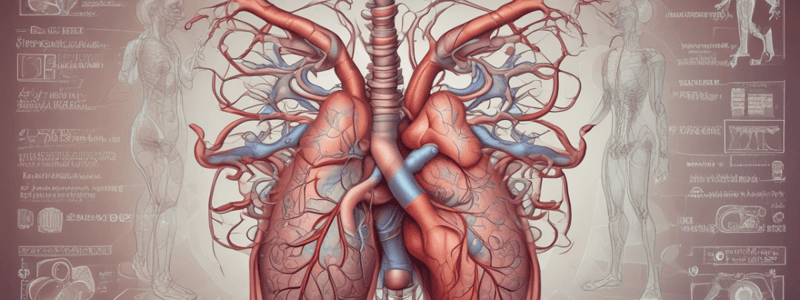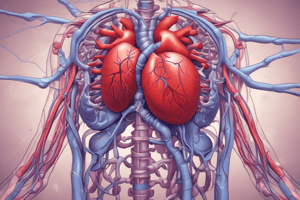Podcast
Questions and Answers
What is the term for a paradoxical increase in jugular venous pressure during inspiration?
What is the term for a paradoxical increase in jugular venous pressure during inspiration?
- Chronic cough
- Abdominojugular reflux
- Kussmaul's sign (correct)
- Cheyne-Stokes breathing
What is an indication of a pleural effusion or lobar pneumonia during percussion?
What is an indication of a pleural effusion or lobar pneumonia during percussion?
- Flatness or Dullness (correct)
- Hyperresonance
- Resonance
- Tympany
Which of the following conditions is associated with Cheyne-Stokes breathing?
Which of the following conditions is associated with Cheyne-Stokes breathing?
- Chronic cough
- Congestive heart failure (CHF) (correct)
- Stroke
- Subacute cough
What is an indication of decerebrate posturing?
What is an indication of decerebrate posturing?
What is a characteristic of hyperventilation?
What is a characteristic of hyperventilation?
What is the ratio of the anteroposterior diameter to the lateral diameter in a normal chest?
What is the ratio of the anteroposterior diameter to the lateral diameter in a normal chest?
What is the term for a cough that lasts longer than 8 weeks?
What is the term for a cough that lasts longer than 8 weeks?
What is the normal depth of penetration of percussion through the chest?
What is the normal depth of penetration of percussion through the chest?
Where can the radial pulse be felt?
Where can the radial pulse be felt?
Where are the sites of pulmonary mucus production located?
Where are the sites of pulmonary mucus production located?
What is an example of an inspiratory adventitious sound?
What is an example of an inspiratory adventitious sound?
What type of cough is usually associated with restrictive conditions like CHF, pulmonary edema, and pulmonary fibrosis?
What type of cough is usually associated with restrictive conditions like CHF, pulmonary edema, and pulmonary fibrosis?
Where is the carotid pulse usually felt?
Where is the carotid pulse usually felt?
What is the primary cause of central cyanosis?
What is the primary cause of central cyanosis?
What is the term for dyspnea that occurs in one lateral decubitus position (left or right) only?
What is the term for dyspnea that occurs in one lateral decubitus position (left or right) only?
What is the term for an abnormal distension of the neck veins seen when firm hand pressure is applied over the abdomen?
What is the term for an abnormal distension of the neck veins seen when firm hand pressure is applied over the abdomen?
What is an indication of an intraabdominal pressure greater than 20 mmHg?
What is an indication of an intraabdominal pressure greater than 20 mmHg?
What is the initial location of percussion in a physical examination?
What is the initial location of percussion in a physical examination?
What is the term for chest pain usually caused by an acute inflammation of the parietal pleura?
What is the term for chest pain usually caused by an acute inflammation of the parietal pleura?
What is the term for the spitting of blood that originated in the respiratory tract below the level of the larynx?
What is the term for the spitting of blood that originated in the respiratory tract below the level of the larynx?
Where is the Dorsalis pedis pulse located?
Where is the Dorsalis pedis pulse located?
What is the term for the introduction to the patient done in?
What is the term for the introduction to the patient done in?
During inspiration in a patient with paradoxical chest wall movement, what happens to the unstable section of the chest wall?
During inspiration in a patient with paradoxical chest wall movement, what happens to the unstable section of the chest wall?
What is the frequency range of normal human hearing?
What is the frequency range of normal human hearing?
What is the term for the collapse or partial collapse of aerated lung tissue?
What is the term for the collapse or partial collapse of aerated lung tissue?
During expiration in a patient with paradoxical chest wall movement, what happens to the unstable section of the chest wall?
During expiration in a patient with paradoxical chest wall movement, what happens to the unstable section of the chest wall?
What is the unit of measurement for sound amplitude?
What is the unit of measurement for sound amplitude?
What is the usual frequency range to which the normal ear is most sensitive?
What is the usual frequency range to which the normal ear is most sensitive?
Study Notes
Respiratory System
- Cheyne-Stokes breathing is associated with stroke, traumatic brain injury, brain tumor, and congestive heart failure.
Jugular Venous Pressure (JVP)
- A paradoxical increase in JVP during inspiration is called Kussmaul's sign.
- Abdominojugular reflux (HJR) is an abnormal distension of the neck veins seen when firm hand pressure is applied over the abdomen.
- A positive HJR test is indicated by a JVP level increasing >3 cm above the baseline and remaining elevated for more than 10 seconds.
Chest and Respiration
- Barrel chest hyperinflation causes the anteroposterior to increase to a 1.1 ratio.
- Dyspnea on mild exertion is often caused by failure of the left ventricular cardiac output to rise during exercise.
- Subacute cough lasts 3 to 8 weeks, usually with a post-infectious origin.
- Chronic cough lasts longer than 8 weeks.
Pulse
- The radial pulse is best felt between the tendon of the flexor carpi radialis and the radius bone at the wrist.
- The brachial pulse can be felt in the upper arm by pressing laterally against the humerus in the bicipital groove or in the lower part of the arm by pressing posteriorly against the humerus.
Abdominal Compartment Syndrome
- Intraabdominal pressures exceeding 20 mmHg can lead to abdominal compartment syndrome.
Chest Pains
- Non-pleuritic chest pains are typically located in the center of the anterior chest and may radiate to the shoulder, neck, or back.
Respiratory Rate and Depth
- Hyperventilation is characterized by a rate and depth greater than metabolic needs, producing a low PaCO2 and a high pH.
- Hypoventilation is characterized by a rate and depth that does not meet metabolic needs, producing a high PaCO2 and a low pH.
Percussion
- Percussion penetrates the chest to 5-7 cm.
- A flatness or dullness on percussion indicates a pleural effusion or lobar pneumonia.
Adventitious Sounds
- Inspiratory adventitious sounds include stridor, crackles (rales), rubs, and rhonchi.
- Rhonchi are low-pitched wheezing, snoring, or squeaking sounds caused by partial airway obstruction.
Tactile Fremitus
- Tactile fremitus is a vibration felt on the patient's chest during low-frequency vocalization.
Posturing
- Decerebrate posturing indicates brain injury, characterized by extension of the arms and legs, and the toes pointing downward and the head arched backward.
- Decorticate posturing indicates damage to the corticospinal tract, characterized by arm flexion, clenched fists, and extended legs.
Pulse Location
- The carotid pulse can be felt between the trachea and the muscles in the neck, just below the mandible.
- The dorsalis pedis pulse is located on the lateral side of the extensor hallucis longus tendon.
Cyanosis
- Central cyanosis is seen in the lips and oral mucosa, caused by a reduction in arterial O2 content, usually due to respiratory failure.
- Peripheral cyanosis is visible in the digits, caused by poor peripheral circulation, which allows increased O2 consumption and reduced Hb saturation in peripheral tissues.
Studying That Suits You
Use AI to generate personalized quizzes and flashcards to suit your learning preferences.
Description
Test your knowledge on cardiovascular and respiratory system related topics, including Cheyne-Stokes breathing, Kussmaul's sign, and abdominojugular reflux. This quiz covers various medical conditions and symptoms.




